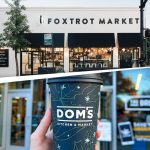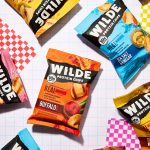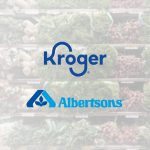Sweet Earth Founder: I Sold to Make Plant-Based A Mainstream Movement

Last week global food and beverage company Nestle finalized its purchase of plant-based food producer, Sweet Earth.
Financial terms of the deal were not disclosed but the seitan, frozen entree and veggie burger producer will maintain its 40,000 square foot plant and headquarters in Moss Landing, California and keep its staff of 200 employees. Founder Kelly Swette and her husband Brian will remain on with the company for a minimum of three years, Swette told NOSH.
Founded in 2011 by the former global VP of marketing for Calvin Klein and former CMO of Pepsi, the company offers over 50 frozen and refrigerated products, all using a variety of plant-protein sources, including beans, chickpeas, seeds, nuts and seitan.
Since their inception, Swette said, much has changed.
“When we started looking at the market in 2011 and then really entered the market in a stronger way in 2012, things were very stogy. The consumer had changed, but there wasn’t enough reaction in the food industry itself to recognize a lot of these signals,” Swette told NOSH. “Then brands like ours and a lot of other young companies came on to kind of begin filling these voids. At first, the big food people felt ‘oh that’s just a little idea, isn’t that sweet?’”
But this change became hard to ignore, Swette believes. For instance, over its roughly six years, Sweet Earth has grown to be sold in more than 10,000 stores, expanding from natural grocers, to conventional and mass retailers. This shift has lead to big CPG brands, like Nestle, looking to acquire brands, like Sweet Earth, in the hopes that they will have millennial appeal from their clean ingredient offerings.
Originally, Sweete said, the company was simply seeking investment. Swette and her husband owned over 50 percent of the company and in order to scale their growth faster, wanted a value-added investor. But the two founders realized that venture capital wasn’t the right path.
Investors were encouraging the brand to pick one category, such as veggie burgers, or one day part, such as breakfast, to own and focus less on covering the whole plant-based food spectrum. Also, the company produces its own items, rather than using a co-packer, and investors were quick to recommend a shift to this production method or lacked experience with companies who self produce.
While Swette said the company didn’t need capital to continue, it was struggling with supply chain and distribution issues. All of Sweet Earth’s products are produced on the West Coast, which makes getting their perishable items to the East Coast expensive. Additionally, as larger companies entered the natural market, the brand found it harder to gain steady, affordable access to organic ingredients.
“We really felt that we wanted people who could add value,” Swette said. “We believe that that the synergies that Nestle brings are going to allow us to accelerate and advance our plant based mission.”
These synergies, she added, include access to distribution networks across the country, experience with cold chain products, and the ability to improve purchasing through economies of scale. So when Nestle president Jeff Hamilton approached the founders, Swette said, the benefits the conglomerate could bring to the table coupled with its promise of independence was too good to pass up.

In turn, Nestle gains access to a new group of possible consumers and fills a hole in their U.S. portfolio — a hole the company can’t afford to overlook. According to firm Meticulous Research, the plant-based protein market will be worth close to $11 billion by 2022.
In a LinkedIn post this week, entitled “we’re putting our money where your mouth is” Nestle chairman and CEO Paul Grimwood wrote, “You can learn a lot about Nestlé by seeing where we put our money. Though we continually look for ways to complement our existing business, we’re also investing in the company we want to be in the years ahead.”
“Our market has never moved so fast, and it will never move so slowly again,” he added. “That means changing with the times by understanding the ever-evolving wants and needs of our customers. This approach to growth is essential as discerning consumers expect high-quality products that are nutritious and responsibly sourced.”
While the deal comes as consumer interest is at a high, competition is growing. Swette noted that in addition to more traditional meat-alternatives, there are now “clean meat” options as well as plant-based options that mimic the taste, texture and mouthfeel of real meat. Primarily, this latter category has been limited to just patties, but Swette believes it will soon expand to other categories.
“I think you’re going to have a real segmentation, like what we’re seeing in veggie burgers right now. [There are] people who are going after plant-based but want it to be really reminiscent of meat and are okay if it contains more lab ingredients,” Swette noted. “But that’s okay, there can be two streams. I think the stream that is more current is the one we’re on, because I think real food right now is what consumers are interested in. And it speaks to them in a more natural way.”
So far, Sweet Earth’s focus and direction seems to certainly resonate with consumers. The company has doubled its business for the last two years and expects this year’s sales to be up over 50 percent. In some categories, Swette noted, the company is outpacing the category. For example, the seitan category, she said, is up over 11 percent while Sweet Earth’s own line of Seitan is up over 45 percent.
While the acquisition, said Swette, will allow the company to scale sales even faster, it’s not just about dollars for her and her husband — it’s about the effect this deal will have on the company’s mission.
“Brian and I have had successful careers in other industries, and we were not doing it for the money. We were doing this, and are doing this and are continuing to do this because this is what we want our legacy to be. We believe in a more sustainable food future,” Swette said. “Our mission can only be as successful as our commercial success. If we want to make sustainable food a big deal and a reality in the United States, it can’t just be for the elite and the young. It has to be for everyone and it needs to become a mainstream movement.”













